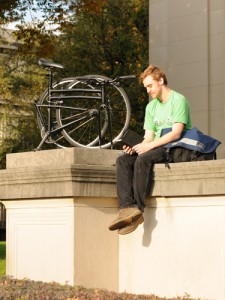
Whether you’ve been to college or not, when you think about courses of study, you probably think about subjects such as history, engineering, biology, or communications. But now, thanks to an initiative at Lees-McRae College in Banner Elk, NC, students have the option of doing a minor in cycling studies.
It’s hardly surprising that Lees-McRae is offering a cycling studies minor. While cycling has been a varsity sport at the small private college for just 10 years, the team has repeated as national champions in all 4 cycling disciplines – mountain biking, road, track, and cyclocross. By offering a program of academic study that focuses on cycling, Lees-McRae hopes to allow its students to explore areas of cycling outside of racing (indeed – the program is intended for all students, not just the college’s competitive cycling squad). The goal of the program is to expose students to as many different facets of cycling as possible, thereby preparing them for a career in the cycling industry.
 Within the minor, possible areas of focus include business, biomechanics and nutrition, bicycle/product design, and environmental and public policy. In addition to a required set of courses, students complete both a field study and an internship in order to familiarize them with all aspects of the cycling industry, from racing and regulatory bodies to repair and retail shops. Students are also encouraged to focus on cycling-related projects in the other courses they are taking.
Within the minor, possible areas of focus include business, biomechanics and nutrition, bicycle/product design, and environmental and public policy. In addition to a required set of courses, students complete both a field study and an internship in order to familiarize them with all aspects of the cycling industry, from racing and regulatory bodies to repair and retail shops. Students are also encouraged to focus on cycling-related projects in the other courses they are taking.
A Bicycle Project
Even if your school doesn’t offer any cycling-specific classes or programs, you can still put your bicycle knowledge to use for some cycling-inspired end of term projects. If you’re a physics or engineering student, this probably isn’t too much of a stretch. If you’re looking for some inspiration, there’s a nice list of possible projects here.
 Some college students even go so far as to build project bicycles. For example, at the Rhode Island School of Design, some students recently built a folding bike as their semester project. “The challenge was to design a human-powered vehicle that could meet the size limit of a carry-on item for any mode of public transportation.” Certain aspects of the design make this bike impractical for commercial purposes – notably the canvas webbing “top tube” and lack of rear brake, but it’s still a pretty cool end-of-term project. It’s no Montague folding bike, but it’s a heck of a lot more fun than a term paper.
Some college students even go so far as to build project bicycles. For example, at the Rhode Island School of Design, some students recently built a folding bike as their semester project. “The challenge was to design a human-powered vehicle that could meet the size limit of a carry-on item for any mode of public transportation.” Certain aspects of the design make this bike impractical for commercial purposes – notably the canvas webbing “top tube” and lack of rear brake, but it’s still a pretty cool end-of-term project. It’s no Montague folding bike, but it’s a heck of a lot more fun than a term paper.
Bike-Writing
Even if you are going to be writing term papers, in most classes, you can probably find a way to discuss cycling, without too much of a stretch. If you’re in the political science venue, you could examine public pressure on legislators to act for or against the interest of cyclists. If you’re taking an English, history, or art history course, you could take a look at how cycling imagery has changed over the past 100 years, and how it affects society. If you’re taking a philosophy class, you might be out of luck.
Have Any Bike Ideas?
What do you think about the cycling studies minor? Do you think it will catch on? Are you a current or prospective college student? Does a program like that interest you? Have you ever incorporated cycling into a project for school or work?



I think that any cycling education program should include lessons on cycling effectively among other traffic, such as those taught in the Cycling Savvy program (http://cyclingsavvy.org/) or the Smart Cycling (http://www.bikeleague.org/programs/education/) program.
Hi Eli,
Those are some good thoughts, however I think this program isn’t strictly focused on bike commuting/transportation cycling, but on the industry as a whole. A student who enrolled in the cycling studies program might be a track racer who never rode on the streets, or might not even ride a bike. Or they might be interested in working with a company that develops new components, or on making frames lighter and more aerodynamic. So while learning the bicycle’s place in traffic is important, a course on this might be a little bit off the mark in a cycling studies program, since there *is* much more to cycling than commuting/transportation cycling. Requiring such a course would be like requiring first aid be part of college curriculum. Certainly not a bad idea, and certainly something everyone should know, but not always strictly relevant to the course of study.
great article thanks for sharing
Hey how much does it cost?
Not sure what the degree program costs. You’ll have to check with Lees-McRae College for more info!
Is this an interesting program for engineers? I’m studying aerospace engineering, but cycling is also a passion of me and I maybe wanna develop race bikes as a job later. So I was wondering if this minor in cycling would help me learn how to design bicycles.